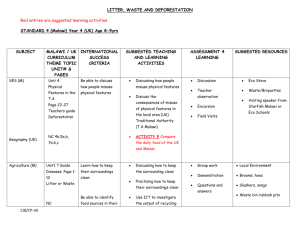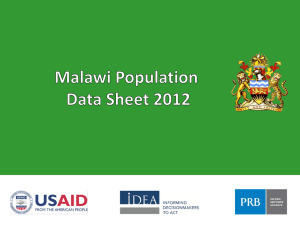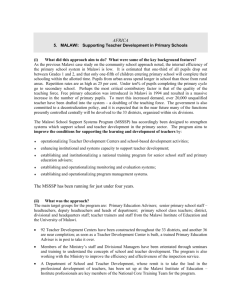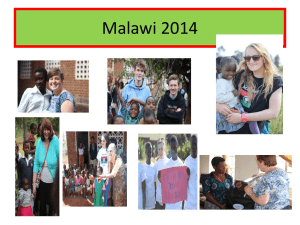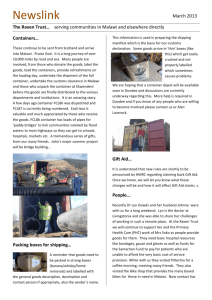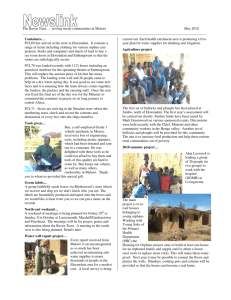Monitoring for Results and Results Reporting
advertisement
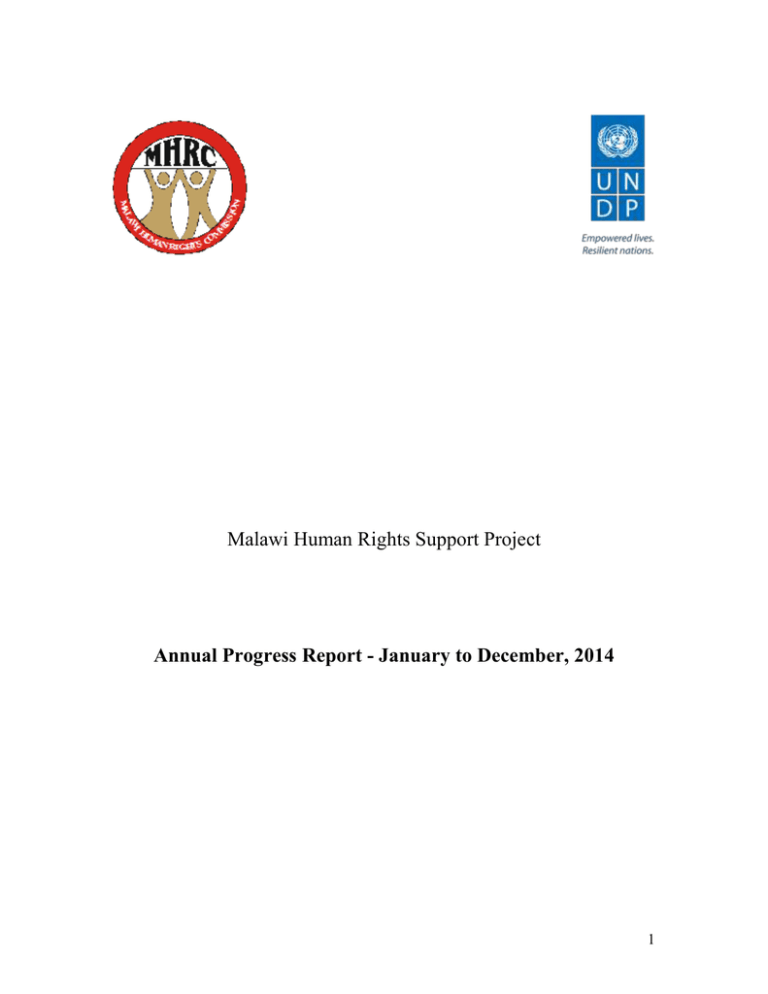
Malawi Human Rights Support Project
Annual Progress Report - January to December, 2014
1
Table of Contents
Accronyms ……………………………………………………………………………… 3
Executive Summary ...........................................................................................................4
1.0 Situational Background ..............................................................................................5
2.0 Assessment of Project Results …………………………………………………...….6
2.1 Summary of Achievement ......................................................................................6
3.0 Gender Mainstreaming …………………………….…………………...…............11
4.0 Key Partners and Inter-agency / Departmental Collaboration………………….12
5.0 Challenges and Lessons Learned …………....……………………………………12
6.0 Conclusion ……………………………...…………………………………………..13
7.0 Annexes ……………………………………………………….…………………….13
Annex 1: Planned Activities and progress for the Period of Review
Annex 2: Financial Report
2
Acronyms
AWP
:
Annual Work Plan
CAT
:
Convention Against Torture
CP
:
UNDP Country Programme
DCP
:
Democracy Consolidation Programme
ECOSOC:
Economic, Social and Cultural Rights Committee
HRNAP (NAP): National Human Rights Action Plan (HRNAP)
ICC
:
International Coordinating Committee of National Human Rights Institutions
MGDS:
Malawi Growth and Development Strategy
MHRC :
Malawi Human Rights Commission
MIE
:
Malawi Institute of Education
MIM
:
Malawi Institute of Management
MoJCA:
Ministry of Justice and Constitutional Affairs
OoO
Office of the Ombudsman
:
UNDAF:
United Nations Development Assistance Framework
UNDP :
United Nations Development Programme
UPR
Universal Periodic Review
:
3
Executive Summary
The Malawi Human Rights Support project has in 2014 continued to support activities
towards the promotion and protection of human rights through supporting national efforts
to strengthen mechanisms and institutions that promote norms and good practices. The aim
it to foster stronger democratic accountability in keeping with the objectives of the MGDS
II.
During the year, Malawi Human Rights Support project finalized the Gender and Human
Rights Study and conducted a technical review of the 2004 -2011 National Action Plan
(NAP) as a foundation for the development of a National Action Plan (NAP) for Human
Rights in Malawi. The Ministry of Justice and Constitutional Affairs (MOJCA) has
constituted Steering and Technical Committees to oversee the development of NAP. The
committees had meetings where a roadmap was agreed on. Unlike in the past when the
NAP development was led by the Malawi Human Rights Commission (MHRC), the current
process is spearheaded by the Ministry of Justice and Constitutional Affairs to ensure
Government ownership and subsequent ease of implementation.
MHRC worked closely with MoJCA on the review of the Human Rights Commission Act
in line with the upcoming review of MHRC by the Sub Committee on Accreditation of the
International Coordinating Committee of National Human Rights Institutions. MHRC
further provided oversight role in promoting transparency, accountability, objectivity and
credibility of the 2014 tripartite elections through monitoring at constituency level and the
main tally center. The Commission also investigated cases of human rights violations
relating to elections irregularities.
Under the same project, the Office of the Ombudsman (OoO) conducted on-spot
investigations of 490 cases on administrative malpractices and 139 determinations of cases
were made. In order to ensure that the public is aware of its activities and can access its
support and services easily, the office also conducted civic education on their roles and
functions.
There has been progress under the Universal Periodic Review Mechanism (UPR) and state
party reports as the Ministry of Justice and Constitutional Affairs has managed to collect
data from all government ministries and all districts on the UPR, Convention Against
Torture (CAT) and International Covenant on Economic Social and Cultural Rights
(ICESCR) and drafted the reports for presentation to the national consultation workshops.
The Ministry presented its report under the Covenant on Civil and Political Rights in July
when Malawi’s record was examined by the UN Human Rights Committee. In September
Malawi submitted its national report under the UPR. The project has also assisted the
Government to collect data for the drafting of the report on the Convention on the Rights
of People with Disabilities with funding from the Government of Norway.
The project has continued to experience some challenges especially in coordination of
project activities. However, frequent board meetings as well as technical and project
4
management meetings have brought fruitful results. The project has beefed up the capacity
of the technical expertise of the Commission by recruiting two project staff.
1.0 Situational Background/Context
Malawi Human Rights Support project is set in the context of institutionalizing a Sector
Wide Approach for Democratic Governance (DGSWAP) in Malawi, to support national
efforts to strengthen mechanisms and institutions to promote norms and good practices and
foster stronger democratic accountability in keeping with the objectives of the MGDS II.
It represents a concrete response by the UN System to assist Malawi to embed democratic
governance through respect for the principles and standards of human rights as entrenched
in the Constitution of Malawi and in international and regional human rights instruments.
The project is aligned to the United Nations Development Assistance Framework
(UNDAF) 2012-2016 outcome 4.1 that states, ‘National institutions foster democratic
governance and human rights to promote transparency, accountability, participation and
access to justice for all especially women and children by 2016’ and the UNDAF Output
4.1.5, ‘National Institutions have capacity to promote and protect human rights especially
the vulnerable, women and children’. Further, the project contributes to the following
UNDP Country Programme Outputs: Governance Sector Wide Approach Programme,
national investment and capacity development plan; Strategic & capacity development
plans for Parliament, Ombudsman, MHRC, and Electoral Commission (MEC).
UNDP has been at the forefront in assisting Malawi to respond to these challenges through
technical and financial support in strengthening the capacities of human rights institutions
and that of the public especially the vulnerable and marginalised groups. Lessons learned
from past UNDP interventions in the area of human rights indicate that support has been
ad hoc in nature with weak synergies built across the key stakeholders responsible for the
promotion and protection of human rights. Secondly, although a number of democratic
governance institutions have relatively similar mandates and similar programmes in
investigations of human rights abuses, promoting human rights based approaches and civic
education, they are not coordinated, resulting in duplication and creating confusion among
citizens. This is compounded by low institutional and technical capacities as well as poor
funding and infrastructural decay in human rights institutions accounting for a lack of
demonstrable impact in the area of human rights.
The Malawi Human Rights Support project is therefore supporting activities towards the
promotion and protection of human rights through supporting national efforts to strengthen
mechanisms and institutions to promote norms and good practices and foster stronger
democratic accountability in keeping with the objectives of the MGDS II. It is supporting
government to develop a national action plan on human rights, capacities of human rights
institutions such as the Malawi Human Rights Commission and Office of the Ombudsman
5
and equipping them with appropriate skills and collaborative planning. The project is also
supporting state party reporting and advocacy for implementation of all UN Human Rights
Mechanisms recommendations and enhanced working relationship between constitutional
bodies and civil society organizations on human rights. It is implemented under the
National Implementation Modality (NIM) with the MHRC acting as implementing partner.
The responsible partners for implementing the project are Ministry of Justice and
Constitutional Affairs and Office of the Ombudsman.
As explained above, the project is set in the context of institutionalizing the Democratic
Governance Sector Wide Approach (DGSWAP). As such, the main activities are designed
to improve coordination in the human rights thematic area within the DGSWAP. Activities
in output 2 are aimed at enhancing the capacities of institutions within the human rights
infrastructure comprising of Government and constitutional bodies while output 4 sets the
platform for coordination between human rights constitutional bodies and the civil society.
Output 1 is on the development of the human rights action plan and all national
stakeholders are expected to be involved, both in the development process and the
implementation. The plan is being spearheaded by the steering committee comprising of
membership within the DGSWAP. The plan is therefore expected to guide the overall
promotion and protection of human rights in Malawi.
The programming and implementation of activities under this project are designed to
complement similar on-going and planned activities of other development partners in the
area of Human Rights. UNDP support seeks to respond to identified strategic gaps in
national and donor programmes, leveraging the comparative advantage of UNDP.
Additionally the Malawi Human Rights Support Project (MHRSP) establishes strategic
partnerships with other programmes which seek to contribute to the improvement of
enjoyment of human rights by Malawians, especially women, children, the youth and other
vulnerable or marginalized groups. In this respect, the Project builds synergies with other
UNDP supported programmes in democratic governance including the Democracy
Consolidation Programme (DCP) and the Elections.
During the year 2014, the project was able to carry out several activities towards attaining
some important milestones. The following paragraphs outline some of these activities.
2.0 Assessment of Project Results During the Reporting Period
The five key outputs were implemented during the year, 2014 and below is progress on
achieving the outputs by the end of December, 2014:
2.1 Summary of Achievement
Output 1: A gender responsive national human rights action plan developed in a
participatory manner and implemented
Indicator 1: Number of institutions involved in the formulation of the National Human
Rights Action Plan
(Baseline: 0; Target: 10)
6
Progress:
Activity Result 1.Concept Note on National Human Rights Action Plan Finalised.
Having conducted a preliminary technical review of the 2004 -2011 NAP document, the
project finalized the concept note that provides, among others, the methodology and
roadmap for review process was finalized.
Activity Result 2: National Human Rights Action Plan Developed
The Project, through the MOJCA, constituted the Steering and Technical Committees on
the development of NAP. So far 10 institutions have been participating in the committee
meetings. Ministry of Justice and Constitutional Affairs is leading the process and MHRC
provides the technical support. The consultations and the drafting of the report is expected
to be done in the first half of 2015. The active involvement of the Ministry of Justice and
Constitutional Affairs is a positive development unlike in the past when the NAP was
developed by MHRC without government involvement. This made implementation of the
plan difficult as the process lacked ownership.
Indicator 2: % of gender sensitive actions in the National Human Rights Action Plan
(Baseline: 0; Target for 2014: Report on gender and human rights in Malawi)
Progress:
Activity Result: The study report on the situation of gender and human rights in Malawi
finalized.
During the period, the Project finalized the report a study on Human Rights and Gender. The
report examines the current situation of women in decision making processes, participation
and leadership at different levels. It also examines the impact of cultural beliefs on women
decision making, the effectiveness of the primary justice system towards women; extent to
which women have access to information; women representation in local governance
structures. It further looks at the plight of women in such issues as gender based violence. The
report also makes recommendations on such issues as: sexual and reproductive health, food
security, economic opportunities, property rights, child marriages, disability rights in the
context of gender; education rights especially the admission policy.
The report observes that there is a gap between women and men with respect to enjoyment of
human rights in Malawi, particularly with respect to participation in decision making. The
report recommends that at the community, district, and national levels, the government, NGOs,
and community members must make the environment more favourable for girls and women
by, amongst others, reserving 50% of places in public secondary schools, especially boarding
secondary schools, and in public colleges/universities for girls. The report also recommends
the same favourable environment for women in leadership positions in committees, in politics,
and in public institutions including parliament. Affirmative action must also apply to persons
7
with disabilities so that their representation in leadership positions is enhanced. On cultural
practices, the report recommends that community leaders with the support of the government
and NGOs must reinvigorate their efforts to sensitise community members to abandon all
cultural practices that infringe on the rights of girls and women. On gender based violence
(GBV), the report recommends concerted efforts by the government and NGOs to conduct
countrywide campaigns to sensitise community members on all forms of GBV, particularly on
sexual, emotional, and economic abuse, and to encourage people, both females and males, to
report to authorities when they have been victimized or when they notice cases of GBV in their
communities. Gender-sensitive interventions to overcome GBV should, among other things,
focus on mechanism supporting victims and increasing access to remedies for the infringement
of human rights.
The report is awaiting printing and dissemination. The study report will inform the
development of National Action Plan for Human Rights in Malawi.
Output 2: Strengthened leadership and technical capacities of the Malawi Human
Rights Commission and the Ombudsman to deliver on their human rights mandates
effectively
Indicator 1: % of human rights violation cases completed.
(Baseline: Partially developed 65% for MHRC and 20% for OoO; Target: 68% cases
completed for MHRC and 25% for OoO)
Progress:
Activity result 1: A human rights architecture with clearly defined roles for institutions
established
During the year, MHRC worked closely with MoJCA on the review of Human Rights
Commission Act in anticipation of the review of MHRC by the Sub Committee on
Accreditation of the International Coordinating Committee of National Human Rights
Institutions. So far, MHRC has reviewed the Human Rights Commission Act and
submitted a comprehensive proposal to MoJCA on areas that require amendments. The
OoO on its part conducted a desk review of the Ombudsman Act. The reports will be used
by the consultant during the stakeholders’ consultation meetings on clarification of roles
between the two institutions. The exercise is also important for accreditation of the MHRC
as the commission seeks more independence in its duties.
Activity Result 2: Strengthened technical capacity for Malawi Human Rights Commission
During the elections period MHRC were involved in several activities on promotion and
protection of human rights. The 2014 elections were very competitive and hence the
likelihood of violence and human rights abuses was high.
8
Activity Result 3: Strengthened technical capacity for the Office of the Ombudsman.
The review and development of performance management systems for the OoO was
completed and the report was finalized. The OoO carried out civic education activities in
the northern, central and southern regions. The public was sensitized on the roles and
functions of the OoO and administrative malpractices. The Office of the Ombudsman also
conducted on-spot investigations for 259 cases in Rumphi, Nkhotakota, Mulanje, Nsanje,
Chikwawa, Chitipa, Karonga, Salima, Mchinji, Dedza and Ntcheu on administrative
malpractices and made 74 determinations of cases from the northern region. In terms of
case management, this seems to be too little progress and therefore UNDP has urged the
three implementing institutions to work together towards a coordinated approach to
managing the caseload. On its part MHRC investigated 56 cases of various human rights
violations including electoral related human rights violations and 4 cases on gender based
violence. The latter were concluded while the former are still on going.
Output 3: Malawi’s engagement on the state party reporting and UPR is improved in a
participatory and consultative manner
Indicator 1: No. of UPR recommendations implemented
(Baseline: 0% {2011}; Target: 10% of accepted recommendations implemented);
Progress:
Activity Result: Improved implementation of the UPR recommendations.
Mechanisms were established to monitor and follow up on implementation of the
recommendations of the UN Human Rights Mechanisms. The task team has since
developed a matrix that will be used to make this follow up. The national human rights
action plan will also be informed by the follow up so that unimplemented recommendations
can be given priority.
Activity Result: UPR report prepared and submitted.
An inter-ministerial taskforce on the UPR led by the Ministry of Justice and Constitutional
Affairs leads the process. The taskforce finalized data collection, drafting and validation of
the UPR report and the report was submitted by the deadline (30 September, 2014). Unlike
the first cycle of the UPR when no report was submitted prior to review process, 2014
report was compiled through a consultative and transparent process and submitted on time.
Indicator 2: No. of state party reports completed.
(Baseline: 0, Target: 6 reports. The target for 2014 is 1 report (accumulated 4 reports).
Progress:
Activity Result: State Party Reporting on course.
9
The project supported Ministry of Justice to draft responses to issues raised by the Human
Rights Committee on the International Covenant on Civil and Political Rights (ICCPR).
The project through MOJCA also facilitated presentation of the State party report under
the International Covenant on Civil and Political Rights at the 111th Session of UN Human
Rights Committee in Geneva, Switzerland from 9th July to 10th July, 2014. The Committee
following its examination of the report made 32 recommendations to the Government for
implementation and the Government and MHRC will follow up the implementation of the
recommendations.
Under the same output, the project collected data and drafted reports on the Convention
Against Torture and International Covenant on Economic, Social and Cultural Rights for
presentation to the National consultation workshops. The project is also supporting the
drafting of the state party report on the Convention on the Rights of People with Disabilities
in cooperation with the Department of Disabilities. Data collection has been completed and
the report is expected to be submitted to the UN Human Rights Committee in 2015.
Output 4: Strengthened partnership between Malawi Human Rights Commission, Office
of the Ombudsman and Non-State Actors on Human Rights through the establishment
and institutionalization of an interface mechanism
Indicator: Improved human rights awareness
(Baseline: 50% [Justice baseline survey 2011] Target:60%)
Progress:
Activity Result: Increased human rights awareness
Under this output, the project supported the mapping exercise that established the number
of CSOs that are operating on the ground in all the districts in the area of human rights. A
workshop with stakeholders in human rights will be organized in order to establish the
human rights coordination forum. The forum will assist in coming up with a human rights
awareness strategy for the country.
During the period, MHRC in collaboration with Malawi Institute of Education (MIE)
trained 276 Head teachers on human rights and Democracy at MIE, Zomba in June 2014.
The aim of the training was to equip primary school head teachers with knowledge, skills
and values pertaining to human rights and democracy as well as pedagogical skills to
support the teaching and learning of Social and Environmental Science in Malawi’s
primary schools.
The project conducted twelve open air sensitization meetings on human rights and they
were held at Mangochi district in group village headman Chowe, Chowe 2, Chowe 3,
Salanje, Wasili, Liundi, Bwanali, Masache, Nsume and Matamanda and in Zomba at
Malawi Institute of Education. A total of 1,140 people including 230 men, 430 women and
500 youths were reached. The meetings equipped members of community groups with
relevant skills and knowledge in human rights. With this knowledge, the communities are
able to report on issues of human rights abuse in their communities.
10
As part of the commemoration of the International Human Rights Day the commission
organized awareness activities that included high level panel discussion on police reforms.
A video documentary on human rights accountability was produced and the Commission
mounted various exhibitions together with other key stateholders during the event. The
project supported three public debates on various emerging human rights issues. The
debates were conducted in Blantyre, Mzuzu and Lilongwe. The Commission also issued
press releases on elections, commemoration of the International Human Rights Day and
emerging issues that were observed.
The project through MHRC monitored the 2014 Tripartite Elections in Malawi. The
Commission noted that the 2014 Tripartite Elections were characterized by administrative
hiccups right from the beginning including registration of voters which was characterized
by shortages of staff. Save for the violence that culminated in the death of two people at
Goliyati in Thyolo and also localized conflicts in Karonga, the campaigning was generally
peaceful. The polling itself was relatively orderly and peaceful in a number of areas but
numerous reports of shortage of materials was reported across the country. In most cases
there was shortage of ballot boxes and sometimes ballot papers. While commending MEC
for ensuring that all people that were eligible to vote did so, it was noted that there were
serious delays in providing materials to the affected centres, resulting in voting starting
very late. The commission released a report on the elections in December, 2014.
Output 5: Effective and efficient management, partnership formation and monitoring
and evaluation of the Programme
(Indicator: % of activities successfully implemented; Target for 2013: 10%)
Progress:
Activity Result: Human rights-based and results-based Monitoring and evaluation
During the period, there were steering meetings in all 4 quarters as well as monitoring field
visits and spot-checks by UNDP. One monitoring visit was conducted for training of head
teachers by the Malawi Institute of Education. Recommendations were made on improving
monitoring of the project so the trained teachers are effectively transferring knowledge to
students in their schools. Two monitoring visits were done for the Office of the
Ombudsman activities while another monitoring visit for the Human Rights Commission
Office of the Ombudsman and Ministry of Justice activities was done jointly in the southern
region.
3.0
Gender Mainstreaming
The impact of the project separately on men and women and the implementation of the
gender mainstreaming strategy in the project will be reviewed at mid-term of the project
implementation. The programme activities are however tailor-made to address the
11
violation of human rights. The vulnerable populations in Malawi include (but is not limited
to) women, children and people with disabilities. The project therefore continued to focus
on human rights protection for women and children. A gender mainstreaming study has
been included in the project with a view to mainstream gender in all activities in the
National Human Rights Action Plan.
4.0
Key Partnerships and Inter-agency/Departmental Collaboration
The project continued to work with organisations like National Initiative for Civic
Education (NICE) and Democracy Consolidation Programme that have stable grass-root
structures for project implementation in many districts. The project strategy is to seek
cooperation with partners in the implementation of activities. MoJCA and OoO are part of
the implementation team while the other civil society organisations are part of the
coordinating team on state party reporting, UPR and human rights awareness interventions.
The project is also supporting the Malawi Institute of Education in training primary school
head teachers on the use of source book on human rights and democracy.
The project is being implemented using funds from UNDP and Royal Norwegian Embassy.
UNDP further collaborates with other UN Agencies through UNDAF outcome 4.1
membership that focuses on governance and human rights issues. Furthermore, the arrival
of the UN Human Rights Advisor has strengthened substantive support for the project.
Partnerships have therefore been prioritised in the implementation of the project.
5.0
Challenges and Lessons Learned
Challenges
a) Financial Capacity of Responsible Offices.
Out of the three institutions, only MHRC possesses reasonable capacity to handle financial
transactions. UNDP organized a training for financial staff and Office of the Ombudsman
benefited from the training. It is therefore expected that there will be better financial
management of project resources in 2015.
b) Declining funding levels by Government
Government funding for the Office of the Ombudsman has been declining over the years
and lately the office has almost come to a standstill. Implementation of project activities is
supposed to complement the implementation of daily activities of the office but when the
office finds itself in a situation OoO is, implementation of the project activities are affected
and impact negatively on desired results.
Lessons Learnt
a) Project Design and Implementation Rate
The project was implemented by three partners namely MHRC, OoO and MOJCA. While
MHRC gets funding through direct cash transfer, the other two partners have continued to
12
receive their funding through direct payments. The latter arrangement proved difficult as
it does not improve the national counterparts’ capacities. The implementation rate is
expected to improve with request to Accountant General to allow MoJ and OoO to open
their holding accounts and access direct funding from UNDP. The partners will continue
to enhance their collaboration through regular technical committee meetings and project
board meetings.
b) Early Preparations
It is evident that delayed development and approval of the annual work plan has in the past
delayed implementation of activities and therefore negotiation process for the approval of
the annual work plan for the next implementation period needs to start earlier for timely
implementation of project activities.
c) Importance of Coordination
The project is demonstrating the importance of coordination as the three implementing
institutions within human rights area have collaborated well in their work. Furthermore
coordination has been experienced among UN institutions that share notes on their
programmes in the human rights area. The emergence of the DG SWAP will further assist
this coordination. The UN agencies are also working together in enhancing human rights
work through the Human Rights Commission under a joint work plan.
6.0 Conclusion
Malawi Human Rights Support project implemented by MHRC, OoO and MoJCA planned
to achieve five main activities of the project. The progress on activity implementation
indicates that 2014 recorded progress especially in the Ministry of Justice and
Constitutional Affairs resulting in progress on producing state party reports and the
national UPR report. Though there are several responsible parties implementing project
activities, cooperation of the Ministry of Justice and Constitutional Affairs ensures that
Government owns the process of promotion and protection of human rights for better lives
for Malawians.
7.0 Annexes
Annex 1: Project Plan and Results for the Period of Review (AWP)
Annex 2: Financial Report
13
Annex 1: Project Plan and Results for the Period- 2014
EXPECTED CP
OUTPUTS AND
TARGETS for
Quarter or period
PLANNED ACTIVITIES
(See
Note 2)
Responsi
ble
Party
(See Note 1)
Output 1: A gender
responsive national
human rights action plan
developed in a
participatory manner and
implemented
Targets:
10 institutions
involved in the
formulation of the NAP
Human Rights
NAP formulated
1.1
Draft a Concept Note on
National Human Rights Action
Plan (HRNAP)
Conduct a study on gender and
human rights
Review of the previous NAP
Review other human rights related
action plan from various sectors for
possible linkages
consult stakeholders
draft the concept note
conduct dialogue to improve
consensusbuilding
and
stakeholder engagement
MHRC
RESULTS OF ACTIVITIES
For each activity, state the results of the
activity
(See Note 3)
During the period, the Project finalized the
study report on the Human Rights and
Gender study. The report is awaiting
printing and dissemination. The study
report will feed into the development of
National Action Plan for Human Rights in
Malawi.
PROGRESS TOWARDS
ACHIEVING OUTPUTS
Status of progress to target contribution to
outcome
(See Note 4)
The preliminary review of the NAP, the
study on Gender and Human Rights, the
concept note and the road map will inform
consultations
meetings
with
the
stakeholders and draft the new NAP.
Further, the Project, though the MoJ
constituted the Steering and Technical
Committees on development of NAP. The
Committees met and adopted the roadmap
and facilitated the review process. The
process to hire consultants commenced.
Ministry of Justice and Constitutional
Affairs steered the process and MHRC
provided the technical support.
14
Output 2: Strengthened
leadership and technical
capacities of the Malawi
Human Rights
Commission and the
Ombudsman to deliver
on their human rights
mandates effectively
Targets:
68% cases completed
(MHRC) and 25% (OoO
of human rights violation
cases completed
2.1 Human Rights architecture with
clearly defined roles for institutions
established
Review the legislation establishing
the MHRC and the Ombudsman
with a view to clarify their
jurisdictions
MHRC
MHRC worked closely with MoJCA on
the review of Human Rights Commission
Act in line with the ongoing accreditation
of MHRC by the International
Coordinating Committee of National
Human Rights Institutions. So far, MHRC
has reviewed the Human Rights
Commission Act and submitted a
comprehensive proposal to MoJCA on
areas that require amendments. The report
will be used by the consultant during the
stakeholders’ consultation meetings. The
consultation meeting will include the
review of the Ombudsman Act.
The review processes, with the
assistance of the Consultants, will pay
attention to clarifying the roles
undertaken by institutions in the
promotion and protection of human
rights, among others.
15
2.2 Strengthened technical capacity
for Malawi Human Rights
Commission
An envisioning exercise of the
MHRC to clarify its role and
approaches to promote and protect
human rights
Prioritization and implementation
of Capacity building initiatives:
Training for MHRC commissioners
and officers in thematic areas ;
includes
training
in
case
management, investigative skills,
human
rights
monitoring,
investigative skills
Engage a Technical Assistant
Public interest litigation in areas of
systemic human rights violation
Examine legislations, judicial
decisions,
administrative
provisions, Bills and proposals to
conform
with
fundamental
principles of human rights
MHRC
The project through MHRC investigated
the irregularities that were observed
during the elections process in all the four
regions. 56 cases on human rights
violation were also investigated.
The project the OoO conducted on-spot
investigations for 500 cases were
conducted in Rumphi, Nkhotakota,
Mulanje, Nsanje, Chikwawa, Chitipa,
Karonga, Salima, Nkhotakota, Mchinji,
Dedza and Ntcheu on administrative
malpractices and made 20 determinations
of cases from the northern region.
The review and development of
performance management systems for the
OoO was completed and the report was
finalized.
The OoO carried out civic education
activities on in the northern, central and
southern regions. The public was
sensitized on the roles and functions of the
OoO and administrative malpractices.
16
2.3 Strengthened technical capacity
for The Office of the Ombudsman
Review of the Strategic Plan and
Service Charter Development
Train staff in Investigative skills
and Case management
Development and Implementation
of Performance Management
System
Monitoring and Evaluation training
and M & E Framework
Development
On-Spot Investigations
Training in Human Rights /
Governance, Gender
Mainstreaming and HRBA
Programming
Procurement of Project Equipment
and Stationery
OoO
The training meetings are expected to
empower officers in the Office of the
Ombudsman to effectively and efficiently
discharge their duties
17
Output 3: Malawi’s
engagement on the state
party reporting and UPR
is improved in a
participatory and
consultative manner
Targets:
20%
of
accepted
recommendations
implemented
5%
of
rejected
recommendations
accepted
1 State Party reports
completed
3.1 Improved implementation of
UPR recommendations and timely
submission of state party reports
Attending regional/ international
HR meetings
Sensitization workshop with other
Government
Ministries,
departments and CSOs on UPR
recommendations
Supporting government ministries
and
departments
on
the
implementation
of
key
recommendations
e.g.
the
independent police complaints
commission
Two National consultative meetings
on UPR for the submission of the
mid- term report by April 2013
Two National consultative meetings
on UPR for the submission of the
2014 report
Drafting of the mid-term report on
UPR for submission by April 2013
Begin drafting of the 2014 report on
UPR in July 2013
A tour to learn best UPR practices
in two countries namely Zambia
and Uganda
Training for human rights unit on
UPR and state party reporting
3 laptops, 1 scanner
MOJCA
The project supported the Malawi
delegation that participated at 111th
Session of International Covenant on Civil
and Political Rights at the Office of the
High Commissioner for Human Rights
headquarters in Geneva, Switzerland from
7th July to 10th July, 2014. The
Committee made 32 recommendation to
the Government for implementation and
the MHRC will follow up the
implementation of the recommendation
The Ministry of Justice will be able to
compile State Party reports and UPR
for submission to the UN
The project through MoJCA collected data
from all government ministries and all
districts on CAT and ICESCR and drafted
the reports for presentation to the National
consultation workshops. Further, National
Consultative and Task Force meetings on
UPR were also held.
18
Output 4: Strengthened
partnership between
Malawi Human Rights
Commission, Office of
the Ombudsman and
Non-State Actors on
Human Rights through
the establishment and
institutionalization of an
interface mechanism
Targets:
Human rights awareness
strategy in place
Output 5: Effective and
efficient management,
partnership formation
and monitoring and
4.1 Increased human rights
awareness
Review the civic education strategy
in Malawi and respond to the gaps
identified with a view to ensure a
systematic and orderly approach
Establish the human rights
coordination
forum:
Conduct
stakeholder mapping to identify
human rights actors among NonState actors such as CSOs and the
media
Support training and monitoring of
Primary Head Teachers on human
rights education through Malawi
Institute of Education
Public awareness sensitization
meetings including human rights
day commemoration
Publicize through media human
rights issues including rights based
approach to social service delivery
MHRC
5.1 Oversight and inputs from project
Board
Project board meetings
Office running
MHRC
A mapping exercise was conducted the
report is being finalized.
The Project through MHRC supported the
training of 96 Primary School Head
Teachers on human rights and democracy
through a workshop held at Malawi
Institute of Education (MIE).
The concept provides the approach to
be used to bring the stakeholders
together
to
establish
and
institutionalize a coordination forum
on civic education in human rights
The project through MHRC supported the
monitoring of 2014 Tripartite elections
and the report is being printed.
The project conducted twelve open air
sensitization meetings on human rights
and a total of 5,112 people including 1,643
men, 1,549 women and 1,920 youths were
reached out. The meetings equipped
members of community groups with
relevant skills and knowledge in human
rights.
The Commission issued press releases
elections and emerging human rights
issues
The Project Board held 3 meetings and
adopted progress reports and work plans
The Board meetings provided guidance
to the implementation and achievement
of planned outputs, the engagement
young professionals and monitoring
visits will enhance the quality of
19
evaluation of the
Programme
Targets:
10 % of activities
successfully
implemented
5.2 Undertake Project quality
assurance, management and
coordination
UNDP and Young Professionals
salary
Meetings: IP review etc
Trainings UNDP P. Analyst and
project staff
MHRC
The project finalized the terms of
reference (ToRs) for the contracting of two
young professionals to be based at MHRC
office. The recruitment will be done
through UNDP.
5.3 Human rights-based and resultsbased Monitoring and evaluation
MHRC
The verification of results was done
through reports on the implemented
activities. The monitoring visits were
conducted.
outputs, management and coordination
of the project implementation
20


